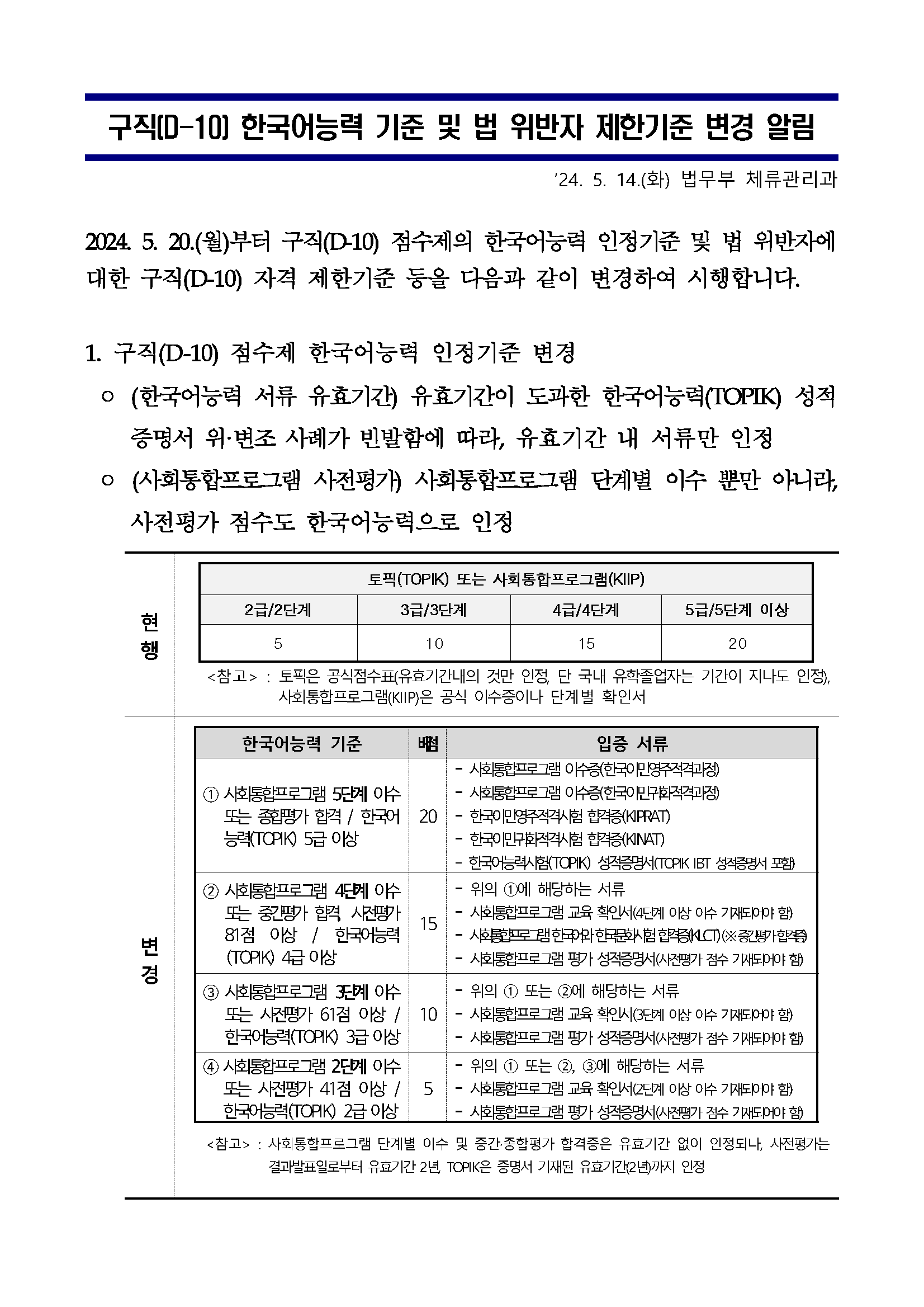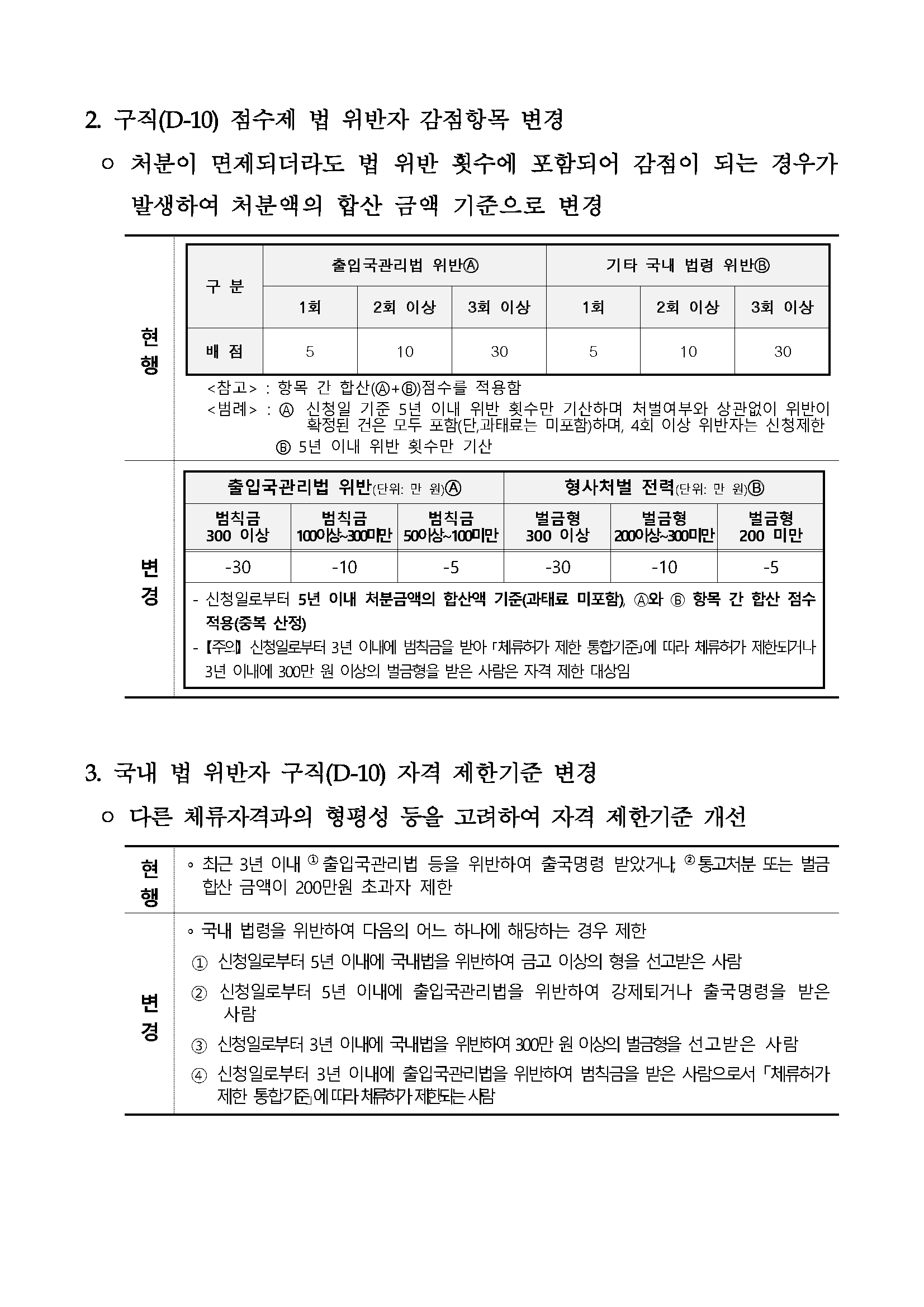Have You Just Graduated and Need Time to Look for a Job in Korea?
If you’ve just graduated and are looking for time to find a job in Korea, the D10 visa, also known as the “Job-Seeking Visa,” can help you stay longer to explore employment opportunities. Below, I’ve compiled the key information based on my own experience applying for the D10 visa.
1. D10 visa eligibility
D2 visa holders can easily change to a D10 visa after graduation without being subjected to the point-based system if you meet all three of the following requirements:
- You hold an undergraduate or master’s degree from a university in Korea.
- You have never been granted a D10 visa before.
- You have graduated from a university in Korea within the last three years.
Additionally, you must meet one of the following criteria:
- Hold a valid test report with TOPIK Level 4 or higher.
- Have passed the mid-term evaluation of Level 4 of the Social Integration Program.
- Have passed the Level 4 exam or Pre-evaluation of Level 5 for KIIP.
Point-Based System Requirements: You are subject to the point-based system and must score at least 60 points to be eligible for a D10 visa if:
- You wish to extend your D10 visa.
- More than three years have passed since your degree was issued.
Points are granted based on your age, educational qualifications, work experience, and other additional criteria. Points may be deducted if you have violated immigration or administrative laws.
2. When is the Ideal Time to Apply for a D10 Visa?
Many foreign students believe they must apply for a D10 visa within 14 days of their graduation ceremony. However, this is not mandatory. In fact, you can apply for a D10 visa just before your D2 visa expires. For example, if you graduate in mid-February or August, you can apply for the D10 visa in March or September, usually 1-2 weeks before your D2 visa expires.
However, there are a few important things to keep in mind to ensure a smooth transition from a D2 to a D10 visa:
- Check with your school’s student office: Confirm whether they will report your graduation status to the Immigration Office immediately after your graduation. This is crucial as any discrepancies could impact your visa application.
- Do NOT leave Korea: Avoid traveling out of Korea after your graduation ceremony and before your D10 visa is granted. Leaving the country during this period could complicate your visa status and lead to potential issues.
- Do NOT engage in any internship activities: Unless you have received approval from the Immigration Office, do not start any internships after graduation. Engaging in unauthorized work activities can lead to the refusal of your D10 visa application.
3. Changes to D10 Visa Applications Effective from May 20, 2024
Significant changes to the Job Seeking (D-10) visa application process are coming into effect on May 20, 2024. Here’s what you need to know:
3.1. Korean Language Proficiency Criteria
* Validity of Korean Language Proficiency Documents: Due to numerous cases of forged or altered TOPIK certificates with expired validity, only documents within their validity period will be accepted.
* Recognition of Social Integration Program Preliminary Evaluations/Entrance Exam: Preliminary evaluation scores from the Social Integration Program will now be accepted as proof of Korean language proficiency, along with completion certificates for each stage.
- + 5 points if you finish KIIP level 2 or your entrance exam score is 41 or higher
- + 10 points if you finish KIIP level 3 or your entrance exam score is 61 or higher
- + 15 points if you finish KIIP level 4 or your entrance exam score is 81 or higher
- + 20 points if you finish KIIP level 5
▶ Important Notes: Completion certificates for the Social Integration Program stages and passing certificates for intermediate and comprehensive evaluations will be recognized indefinitely. Preliminary evaluation scores are valid for 2 years from the date of result announcement, and TOPIK certificates are valid for 2 years from the date indicated on the certificate.
3.2. Penalty Points for Legal Violations
** Inclusion of Waived Penalties: Even if penalties are waived, they will still count towards legal violations, resulting in penalty points based on the total penalties incurred.
** Revised Criteria for Legal Violations: Previously, criteria were based on the number of violations of the Immigration Control Act and other domestic laws. Now, the criteria are based on the total amount of penalties and criminal records within 5 years from the application date (excluding fines). The combined score of penalties and criminal records will be considered.
▶ Important Notes: Applicants who have received a fine within 3 years from the application date or have fines totaling 3 million won or more within 3 years will face qualification restrictions according to the “Integrated Criteria for Stay Permit Restriction.”
3.3. Qualification Restrictions for Domestic Law Violators Previous Restrictions
Restrictions applied to those ordered to leave the country for violating the Immigration Control Act or other laws within the last 3 years, or those with fines exceeding 2 million won.
▶ Revised Restrictions: Restrictions now apply to those who have violated domestic laws and fall under any of the following four cases, as detailed in the new criteria.
- Within 5 years of the application date: Individuals who have violated domestic laws and have been sentenced to imprisonment or a more severe punishment.
- Within 5 years of the application date: Individuals who have violated the Immigration Control Act and have been forcibly deported or received a departure order.
- Within 3 years of the application date: Individuals who have violated domestic laws and have been fined 3 million KRW or more.
- Within 3 years of the application date: Individuals who have violated the Immigration Control Act and have been fined, and are thereby restricted from obtaining a residence permit according to the “Integrated Standards for Residence Permit Restrictions.”


Applying for a D10 visa can be straightforward if you adhere to the guidelines. However, if you are unsure about any part of the application process or cannot reserve a day to visit the Immigration Office, it is highly recommended to seek assistance from an authorized migration agent.
Discover more from VNFLEX
Subscribe to get the latest posts sent to your email.